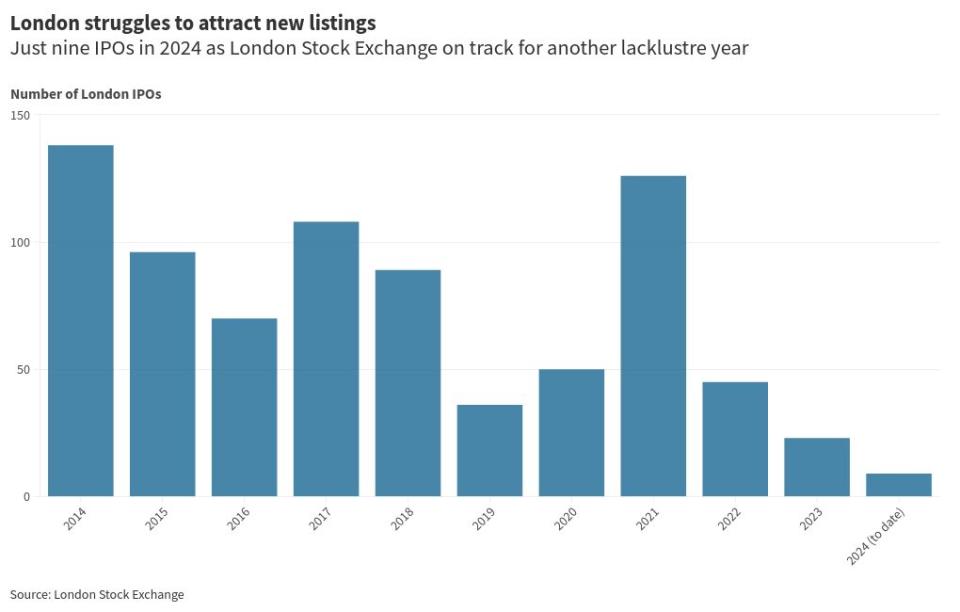UK’s cash-strapped fintechs brace for buyouts as London IPOs stall

Amid a dearth of IPO activity, the UK’s fintech sector is bracing for more consolidation as successful start-ups expand and established players fend off future rivals.
Industry leaders told City AM that cash-strapped firms would feel increasing pressure to consider buyout offers, with venture capital investment subdued and public listings a scarce exit strategy.
Higher interest rates triggered a drop-off in funding two years ago that the sector has only partially recovered from.
There was $7.3bn (£5.7bn) of UK fintech investment in the first half of 2024, up from $2.5bn (£2bn) during the same period last year, according to KPMG.
Still, this figure is a far cry from the record £23.4bn seen in the first half of 2021 – when VCs ploughed money into young firms with bold ideas at sky-high valuations.
“Two years in start-up world is a lifetime,” said one major fintech boss.
“There has been a lot less money around, forcing smaller firms to consider mergers. Meanwhile, incumbents have lots of cash to buy fintechs.”
They said the next 12 months would see an “acceleration” of M&A activity, with VC funding only approaching “2019, 2020 levels” so far.
The person argued that interest rate cuts should boost investment and expected the market to more fully recover within the next nine months.
In the meantime, however, major fintechs have accepted lower valuations to secure cash as they struggle to achieve the profitability that investors are placing greater emphasis on.
A funding round announced last week saw eight-year-old payments platform TrueLayer’s valuation cut by around 30 per cent, according to a person familiar with the matter.
That strips the London-based firm of its more than $1bn “unicorn” status acquired in a 2021 fundraise.
Chief executive Francesco Simoneschi told City AM in June that the “funding environment is way tighter than it used to be”. On Friday, he confirmed in a LinkedIn post that TrueLayer had restructured its operations and cut jobs to improve profitability.
The firm’s latest accounts show that while TrueLayer’s operating losses narrowed in 2023, they still totalled £54.1m as administrative expenses of £61.9m offset a tripling in revenue.
Underscoring how quickly fintech investments can go sour, HSBC last month wrote off its minority stake in lossmaking neobank Monese after just two years.
Monese, founded in 2015 and once hailed as a potential “unicorn”, has embarked on a restructuring and breakup after warning in January that its future was in question amid struggles to secure more funding. The firm is now reportedly trying to sell its consumer arm.
Dealmaking spree
The number of UK fintech M&A deals surged from 14 in 2019 to 44 in 2023, peaking at 50 in 2021, according to data provided to City AM by Dealroom.
This year has so far seen 31 deals, with disclosed valuations totalling $1.1bn (£842m).
The biggest include private equity firm Bridgepoint’s £626m swoop for Alpha Financial Markets and Robinhood’s $200m (£153m) deal with crypto exchange Bitstamp.
“If you look at all the fintech exits over the last five or six years, only five per cent have exited to IPO – so that gives you a sense of the direction of travel,” said Tim Levene, chief executive of Augmentum Fintech, Europe’s largest listed fintech fund.
He added that the trend for fintechs to exit through M&A “would become even more prevalent over the coming years”.
One chief executive said “phase one” of UK fintech, involving “arrivals, lots of VC money and few big outliers”, was coming to an end.
Consolidation is now key to “phase two” as fintechs become large institutions that pose a more serious threat to dominant players, they added.
Examples cited by fintech bosses of so-called “defensive acquisitions” include Visa’s €1.8bn purchase of Swedish open banking platform Tink in 2022, which followed an abandoned $5.3bn takeover deal for US rival Plaid in 2021.
The US Department of Justice had filed an antitrust lawsuit on grounds that Visa acquiring Plaid would limit competition in the payments industry.
Europe’s open banking fintechs, which enable payments directly between bank accounts, have positioned themselves as disruptors to card networks dominated by Visa and Mastercard – with both giants absorbing a range of start-ups to bolster their operations.
Within the last two weeks, Mastercard agreed to buy Swedish subscription management firm Minna Technologies, while Visa is set to acquire London-based payments protection provider Featurespace.
“Financial incumbents continue to be challenged in many respects, and they are looking to the fintech market to in some cases compete head on or build a technology solution that they can ultimately plug in themselves because they found it difficult to do at their end,” Levene said.
On the other hand, a crop of British fintech “unicorns” that burst onto the scene in the 2010s are eyeing M&A as a way to take further market share from established firms.
A senior official at a well-known challenger bank said their company was actively looking for bolt-on acquisitions that could grow its digital offering into new verticals.
IPO slump
Despite urgent efforts from the government and regulators to inject more life into capital markets, London IPOs are still considered a risky exit strategy among some fintech chiefs.
One said their firm and its peers were wary of listing in the capital anytime soon as “businesses are not getting good valuations”, adding that a rare fintech float would mean “all eyes are on you”.
The last major fintech to list in the UK was money transfer outfit CAB Payments, which floated at a valuation of £851m in July 2023.
The London Stock Exchange’s biggest IPO last year, it is currently trading 66 per cent below its initial share price.
Other recent fintech listings have not fared much better. Money transfer firm Wise is down 32 per cent since 2021, small business lender Funding Circle has slumped 70 per cent since 2018, and mortgage platform LendInvest has tumbled 86 per cent since 2021.

The broader London stock market has struggled to lure big-ticket IPOs in recent years. While bankers are cautiously optimistic for a recovery in 2025, just nine firms have floated on the LSE so far this year.
That compares to 18 during the same period in 2023, which became the worst year in almost three decades for London floats with 23 IPOs.
An executive at one British fintech that had previously drawn up plans for a multibillion-pound London float said their firm no longer had a timeline and refused to use a specific term when discussing the matter – instead referring to a “capital event”.
“The likely exit for a lot of our portfolio companies will be M&A, rather than IPO,” Levene said. “We’d love to see many of our companies IPO, but there’s a huge amount of strategic value in a lot of the fintechs being built.
“I would love there to be 20 or 30 truly disruptive fintechs that are listed in London, but we just don’t have enough data points in the listed market to be able to point to great outcomes that can encourage and incentivise other founders to say ‘Hey, let’s [list] a little bit early.’”